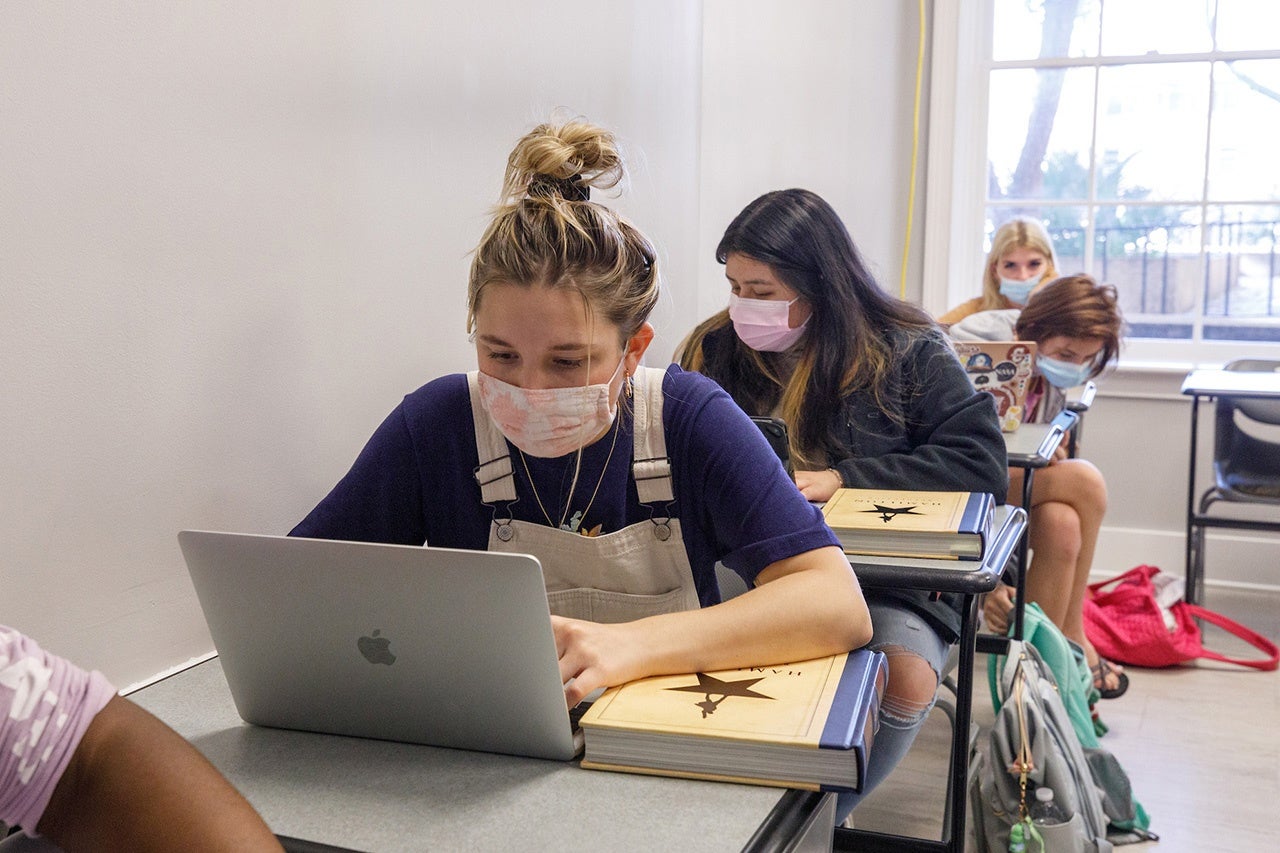Above: Students work on an assignment in theatre Professor Susan Kattwinkel’s First Year Experience course that explores the musical ‘Hamilton.’
William Ganas draws a deep breath as he gets ready to address the students sitting in front of him. “The author of this chapter,” he says, “asks us to consider the significance of Black actors playing the part of white founding fathers in Lin Manuel Miranda’s musical Hamilton. She writes about the concept of a Model Minority and suggests that there’s racism in Miranda’s work that isn’t really explored.”
As one of 20 first-year students enrolled in College of Charleston theatre Professor Susan Kattwinkel’s seminar Reading Hamilton: Hip Hop and History in the American Musical, Ganas is learning a lot. Specifically, he’s learning to use the tools of scholarship to critique popular culture. Part of that process involves preparing and making this presentation to the class, along with his study partner Jennifer Monrroy-Resendiz.

Theatre professor Susan Kattwinkel (center) with William Ganas and Jennifer Monrroy-Resendiz, two students in her FYE course “Reading Hamilton: Hip Hop and History in the American Musical.” (Photos by Heather Moran)
“I’m a big fan of musicals, and I’ve seen Hamilton before,” Ganas says, “but I’d only considered it from an entertainment point of view. For our presentation, we read a chapter written by a historian who discusses how the musical is unintentionally racist. Making that presentation helped me understand the ways in which the musical glosses over the racism of that era.”
Kattwinkel’s course is one of more than 70 first-year seminars offered at the College this semester. Like all the others, it’s been purposely designed to help first-year students acclimate to college life – something that nearly every university in the country does to ensure students have a successful transition from high school to college.
At CofC, this work is coordinated as part of the First Year Experience program (FYE). With over 100 courses designed and offered expressly for first-year students, it’s not surprising that U.S. News & World Report has recognized CofC’s FYE program as being among the top in the nation.
According to professor Sarah Owens, who directs the College’s FYE program, it’s all about mentoring.
“One of our key objectives is to provide students the opportunity to develop a close connection with a faculty member, a staff member or a peer,” she explains. “We know that students are successful when they make these important connections, and that’s backed up by hard data.”
At the College, it’s a requirement that all first-year students take either an FYE seminar or an FYE learning community course. According to Owens, FYE seminar courses are intentionally kept small, with no more than 24 students.
“We want students to have ample opportunity to connect with the professor,” she says. “And in the rare case that this doesn’t happen, then they ordinarily make a connection with their peer facilitator. Those are students who are nominated by faculty members to serve in this role. Peer facilitators instruct the students in a once-a-week affiliated course designed help them get up to speed regarding the many intricacies of college life.”
Another key distinction of FYE at the College is the diverse range of topics first-year students can choose from. This fall, those offerings run the gamut from Race and Ethnicity in American Comic Fiction to Food, Travel and Faith in Asia to The Physics of Minecraft and so much more.
Kattwinkel’s unique course fits squarely into that list of diverse offerings. And it works well as a means of helping students transition to the caliber of work required at the college level.

Theatre Professor Susan Kattwinkel talks to her students about the themes and nuances of the musical ‘Hamilton.’
“In part,” Kattwinkel says, “this course is intended as an introduction to the world of scholarship in the liberal arts. The students are learning that you can critique products of popular culture and understand how they function within the broader society without losing your love for them. What we know is that critical responses to works of art change over time, and tracing that change with one musical also provides a model for understanding the relationship between art and society.”
Ganas agrees. He says this course has helped him adjust to college and learn about campus resources.
“The Hamilton course definitely pushes you to think differently about the subject matter,” he says, “but it also helped me work at the college level. Early on, the course introduced me to the resources at Addlestone Library so that I could complete an annotated bibliography assignment. And, like every other freshman, I’m taking an affiliated synthesis course led by our peer facilitator – an upperclass student. She’s helped us better understand different campus resources such as the library, but also how to get involved, how to stay safe, how to get help – both mental and physical – etc.
“For me,” he continues, “the Hamilton course is a lot different than other college classes because it’s one that I got to pick and it’s a topic that I enjoy. It still requires all the work you have to do in a college class, but it’s been pretty engaging.”
One of the best things about it, he says, is that it also led him to meet his closest friend on campus.
“We live in the same residence hall, so we met walking to that class,” Ganas says. “We’ve become inseparable now, and that’s great.”




